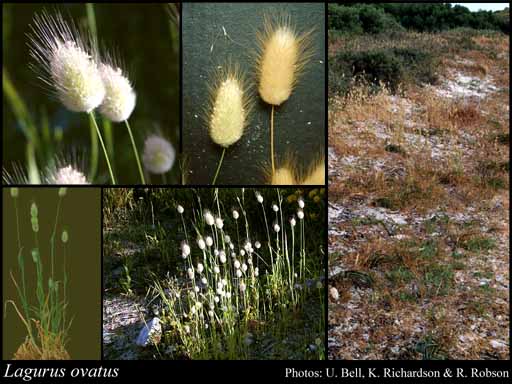- Reference
- Sp.Pl. [Linnaeus] 1:81 (1753)
- Conservation Code
- Not threatened
- Naturalised Status
- Alien to Western Australia
- Name Status
- Current
Annual, grass-like or herb, 0.1-0.3 m high. Fl. white/other, Aug to Dec or Mar (occasionally). White, grey, brown or black sand. Swamp edges, roadsides, dunes.

Distribution
- IBRA Regions
- Esperance Plains, Hampton, Jarrah Forest, Swan Coastal Plain, Warren.
- IBRA Subregions
- Fitzgerald, Hampton, Northern Jarrah Forest, Perth, Recherche, Southern Jarrah Forest, Warren.
- IMCRA Regions
- Central West Coast, Leeuwin-Naturaliste, WA South Coast.
- Local Government Areas (LGAs)
- Albany, Augusta Margaret River, Busselton, Cambridge, Capel, Cockburn, Dandaragan, Denmark, Dundas, Esperance, Fremantle, Jerramungup, Joondalup, Mandurah, Manjimup, Melville, Murray, Nedlands, Perth, Plantagenet, Rockingham, Serpentine-Jarrahdale, South Perth, Stirling, Wanneroo.
Management Notes (for the Swan NRM Region)
Alternative Names. Bunny's tails.
General Biology. Growth form. Grass. Life form. Annual, caespitose. Reproduction. Seed. Dispersal. Mammals, wind. Photosynthetic Pathway. C3. Seedbank persistence. 2-3 years.
Notes. Widespread on sandy soils particularly in coastal areas. Can lead to declines in native plant species cover and diversity and make coastal vegetation more susceptible to summer fire. Has staggered germination.
Additional information. Origin. Mediterranean, southern Europe, eastern Europe, northern Africa, temperate Asia. History of use/introduction. Ornamental.
Suggested method of management and control. Prevent seed set. Hand removal small isolated infestations. In selective situations spray with 16 ml/10 L (800 ml/ha) Fusilade® Forte + spray oil or for generic fluazifop-p (212g/L active ingredient) 10ml/10L or 500ml/ha + spray oil any time before flowering. A lower rate of 13 ml/10 L Fusilade® Forte or for generic fluazifop-p (212g/L active ingredient) 8ml/10L can be used in winter at the 2-8 leaf stage before stem elongation. Read the manufacturers' labels and material safety data sheets before using herbicides. For further information consult the Australian Pesticides and Veterinary Medicines Authority to determine the status of permits for your situation or state.
Management Calendar
| Calendar Type | Jan | Feb | Mar | Apr | May | Jun | Jul | Aug | Sep | Oct | Nov | Dec | Comments |
|---|---|---|---|---|---|---|---|---|---|---|---|---|---|
| Active Growth | Y | Y | Y | Y | Y | Y | |||||||
| Germination | U | U | |||||||||||
| Flowering | Y | Y | Y | Y | |||||||||
| Fruiting | Y | Y | |||||||||||
| Herbicide Treatment | Y | Y | Y | O | O | ||||||||
| Manual Removal | Y | Y | Y | Y | Y | Y |
Legend: Y = Yes, regularly, O = Occasionally, U = Uncertain, referred by others but not confirmed.
References
- Anon. (2008) Risk Assessment - Lagurus ovatus. Pacific Island Ecosystems at Risk (PIER) URL: http://www.hear.org/pier/wra/pacific/lagurus_ovatus_htmlwra.htm - Accessed January 2010.
- Blood, K. (2001) Environmental weeds: a field guide for SE Australia. C.H. Jerram and Associates, Melbourne.
- Brown, K. & Brooks, K. (2002) Bushland Weeds: A Practical Guide to their Management. Environmental Weeds Action Network, Greenwood.
- Carr, G.W., Yugovic, J.V. & Robinson, K.E. (1992) Environmental weed invasions in Victoria. Department of Conservation and Environment, Melbourne.
- Hussey, B.M.J., Keighery, G.J., Dodd, J., Lloyd, S.G. & Cousens, R.D. (2007) Western Weeds. A guide to the weeds of Western Australia. 2nd Edition. The Plant Protection Society of Western Australia, Victoria Park.
- Moore, C.B. & Moore, J.H. (2002) Herbiguide, the pesticide expert on a disk. Herbiguide, PO Box 44 Albany, Western Australia, 6330.
- Moore, J.H. & Wheeler, J. (2008) Southern weeds and their control. DAFWA Bulletin 4744.
- USDA, ARS, National Genetic Resources Program (2009) Germplasm Resources Information Network - (GRIN). National Germplasm Resources Laboratory, Beltsville, Maryland. URL: https://npgsweb.ars-grin.gov/gringlobal/taxon/taxonomysimple.aspx - Accessed October 2009.